How has the Joint Comprehensive Plan of Action (JCPOA)—signed between the P5+1 and Iran one year ago—played out in practice? Several Brookings scholars, many of whom participated prominently in debates last year surrounding official congressional review, offered their views.
|
Strobe Talbott, President, Brookings Institution:
At the one-year mark, it’s clear that the nuclear agreement between Iran and the major powers has substantially restricted Tehran’s ability to produce the fissile material necessary to build a bomb. That’s a net positive—for the United States and the broader region. |
|
Robert Einhorn, Senior Fellow, Center for 21st Century Security and Intelligence and Senior Fellow, Arms Control and Non-Proliferation Initiative, Foreign Policy program:
One year after its conclusion, the JCPOA remains controversial in Tehran and Washington (as I describe in more detail here), with opponents unreconciled to the deal and determined to derail it. But opponents have had to scale back their criticism, in large part because the JCPOA, at least so far, has delivered on its principal goal—blocking Iran’s path to nuclear weapons for an extended period of time. Moreover, Iran’s positive compliance record has not given opponents much ammunition. The IAEA found Iran in compliance in its two quarterly reports issued in 2016.
But challenges to the smooth operation and even the longevity of the deal are already apparent. |
A real threat to the JCPOA is that Iran will blame the slow recovery of its economy on U.S. failure to conscientiously fulfill its sanctions relief commitments and, using that as a pretext, will curtail or even end its own implementation of the deal. But international banks and businesses have been reluctant to engage Iran not because they have been discouraged by the United States but because they have their own business-related reasons to be cautious. Legislation proposed in Congress could also threaten the nuclear deal.
For now, the administration is in a position to block new legislation that it believes would scuttle the deal. But developments outside the JCPOA, especially Iran’s regional behavior and its crackdown on dissent at home, could weaken support for the JCPOA within the United States and give proponents of deal-killing legislation a boost.
A potential wildcard for the future of the JCPOA is coming governing transitions in both Washington and Tehran. Hillary Clinton would maintain the deal but perhaps a harder line than her predecessor. Donald Trump now says he will re-negotiate rather than scrap the deal, but a better deal will not prove negotiable. With President Hassan Rouhani up for re-election next year and the health of the Supreme Leader questionable, Iran’s future policy toward the JCPOA cannot be confidently predicted.
A final verdict on the JCPOA is many years away. But it is off to a promising start, as even some of its early critics now concede. Still, it is already clear that the path ahead will not always be smooth, the longevity of the deal cannot be taken for granted, and keeping it on track will require constant focus in Washington and other interested capitals.
Suzanne Maloney, Deputy Director, Foreign Policy program and Senior Fellow, Center for Middle East Policy, Foreign Policy program:
The Joint Comprehensive Plan of Action has fulfilled neither the worst fears of its detractors nor the most soaring ambitions of its proponents. All of the concerns that have shaped U.S. policy toward Tehran for more than a generation—terrorism, human rights abuses, weapons of mass destruction, regional destabilization—remain as relevant, and as alarming, as they have ever been. Notably, much the same is true on the Iranian side; the manifold grievances that Tehran has harbored toward Washington since the 1979 revolution continue to smolder.
An important truth about the JCPOA, which has been wielded by both its defenders and its detractors in varying contexts, is that it was transactional, not transformational. As President Barack Obama repeatedly insisted, the accord addressed one specific problem, and in those narrow terms, it can be judged a relative success. The value of that relative success should not be underestimated; a nuclear-armed Iran would magnify risks in a turbulent region in a terrible way.
But in the United States, in Iran, and across the Middle East, the agreement has always been viewed through a much broader lens—as a waystation toward Iranian-American rapprochement, as an instrument for addressing the vicious cycle of sectarian violence that threatens to consume the region, as a boost to the greater cause of moderation and democratization in Iran. And so the failure of the deal to catalyze greater cooperation from Iran on a range of other priorities—Syria, Yemen, Iraq, to name a few—or to jumpstart improvements in Iran’s domestic dynamics cannot be disregarded simply because it was not its original intent.
For the “new normal” of regularized diplomatic contact between Washington and Tehran to yield dividends, the United States will need a serious strategy toward Tehran that transcends the JCPOA, building on the efficacy of the hard-won multilateral collaboration on the nuclear issue. Iranians, too, must begin to pivot the focus of their efforts away from endless litigation of the nuclear deal and toward a more constructive approach to addressing the deep challenges facing their country today.
Bruce Riedel, Senior Fellow, Center for Middle East Policy and Center for 21st Century Security and Intelligence and Director, Intelligence Project, Foreign Policy program:
As I explain more fully here, one unintended but very important consequence of the Iran nuclear deal has been to aggravate and intensify Saudi Arabia’s concerns about Iran’s regional goals and intentions. This fueling of Saudi fears has in turn fanned sectarian tensions in the region to unprecedented levels, and the results are likely to haunt the region for years to come.
Riyadh’s concerns about Iran have never been primarily focused on the nuclear danger. Rather, the key Saudi concern is that Iran seeks regional hegemony and uses terrorism and subversion to achieve it. The deal deliberately does not deal with this issue. In Saudi eyes, it actually makes the situation worse because lifting sanctions removed Iran’s isolation as a rogue state and gives it more income.
Washington has tried hard to reassure the Saudis, and President Obama has wisely sought to build confidence with King Salman and his young son. The Iran deal is a good one, and I’ve supported it from its inception. But it has had consequences that are dangerous and alarming. In the end, Riyadh and Tehran are the only players who can deescalate the situation—the Saudis show no sign of interest in that road.
Norman Eisen, Visiting Fellow, Governance Studies:
The biggest disappointment of the post-deal year has been the failure of Congress to pass legislation complementing the JCPOA. There is a great deal that the legislative branch could do to support the pact. Above all, it could establish criteria putting teeth into U.S. enforcement of Preamble Section III, Iran’s pledge never to seek nuclear weapons. Congress could and should make clear what the ramp to seeking nuclear weapons would look like, what the triggers would be for U.S. action, and what kinds of U.S. action would be on the table. If Iran knows that, it will modulate its behavior accordingly. If it does not, it will start to act out, and we have just kicked the can down the road. That delay is of course immensely valuable—but why not extend the road indefinitely? Congress can do that, and much more (e.g. by increasing funding for JCPOA oversight by the administration and the IAEA), with appropriate legislation.
Richard Nephew, Nonresident Senior Fellow, Center for 21st Century Security and Intelligence, Arms Control and Non-Proliferation Initiative, Foreign Policy program:
Over the past year, much effort has gone into ensuring that the Iran deal is fully implemented. To date, the P5+1 has—not surprisingly—gotten the better end of the bargain, with significant security benefits accruing to them and their partners in the Middle East once the International Atomic Energy Agency (IAEA) verified the required changes to Iran’s nuclear program. Iran, for its part, has experienced a natural lag in its economic resurgence, held back by the collapse in oil prices in 2014, residual American and European sanctions, and reluctance among banks and businesses to re-engage.
But, Iran’s economy has stabilized and—if the deal holds for its full measure—the security benefits that the P5+1 and their partners have won may fall away while Iran’s economy continues to grow. The most important challenge related to the deal for the next U.S. administration (and, presumably, the Rouhani administration in its second term) is therefore: how can it be taken forward, beyond the 10- to 15-year transition period? Iran will face internal pressure to expand its nuclear program, but it also will face pressure to refrain both externally and internally, should other countries in the region seek to create their own matching nuclear capabilities.
The best next step for all sides is to negotiate a region-wide arrangement to manage nuclear programs –one that constrains all sides, though perhaps not equally. It must ensure—at a minimum—that nuclear developments in the region are predictable, understandable, and credibly civilian (something Bob Einhorn and I addressed in a recent report). The next White House will need to do the hard work of convincing countries in the region—and beyond—not to rest on the victory of the JCPOA. Rather, they must take it for what it is: another step towards a more stable and manageable region.
Tamara Wittes, Senior Fellow and Director, Center for Middle East Policy, Foreign Policy program:
This week, Washington is awash in events and policy papers taking stock of how the Iran nuclear deal has changed the Middle East in the past year. The narratives presented this week largely track the positions that the authors, speakers, or organizations articulated on the nuclear deal when it was first concluded last summer. Those who opposed the deal have marshaled evidence of how the deal has “emboldened” Iran’s destabilizing behavior, while those who supported the deal cite evidence of “moderated” politics in the Islamic Republic. That polarized views on the deal last year produce polarized assessments of the deal’s impact this year should surprise no one.
In fact, no matter which side of the nuclear agreement’s worth it presents, much of the analysis out this week ascribes to the nuclear deal Iranian behavior and attitudes in the region that existed before the deal’s conclusion and implementation. Iran has been a revisionist state, and a state sponsor of terrorism, since the 1979 Islamic Revolution. The Saudi-Iranian rivalry predates the revolution; Iran’s backing of Houthi militias against Saudi and its allies in Yemen well predates the nuclear agreement. Most notably, the upheavals in the Arab world since 2011 have given Iran wider opportunities than perhaps ever before to exploit the cracks within Arab societies—and to use cash, militias, and other tools to advance its interests and expand its influence. Iran has exploited those opportunities skillfully in the last five years and, as I wrote last summer, was likely to continue to do so regardless of diplomatic success or failure in Vienna. To argue that the nuclear deal somehow created these problems, or could solve them, is ahistorical.
It is true that Iran’s access to global markets might free even more cash for these endeavors, and that is a real issue worth tracking. But since severe sanctions did not prevent Iran from spending hundreds of millions of dollars to support and supply Hezbollah, or marshaling Islamic Revolutionary Guard Corps (IRGC) and militia fighters to sustain the faltering regime of Bashar Assad in Syria, it’s not clear that additional cash will generate a meaningful difference in regional outcomes. Certainly, the nuclear deal’s conclusion and implementation did not alter the trajectory of Iranian policy in Yemen, Iraq, Syria, or Lebanon to any noticeable degree—and that means that, no matter what the merits or dangers of the JCPOA, the United States must still confront and work to resolve enduring challenges to regional instability—including Iran’s revisionist behavior.
Kenneth M. Pollack, Senior Fellow, Center for Middle East Policy, Foreign Policy program:
When the JCPOA was being debated last year, I felt that the terms of the deal were far less consequential than how the United States responded to Iranian regional behavior after a deal was signed. I see the events of the past 12 months as largely having borne that out. While both sides have accused the other of “cheating,” the deal has so far largely held. However, as many of my colleagues have noted, the real frictions have arisen from the U.S. geostrategic response to the deal.
I continue to believe that signing the JCPOA was better than any of the realistic alternatives—though I also continue to believe that a better deal was possible, had the administration handled the negotiations differently. However, the administration’s regional approach since then has been problematic—with officials condemning Riyadh and excusing Tehran in circumstances where both were culpable and ignoring some major Iranian transgressions, for instance (and with President Obama gratuitously insulting the Saudis and other U.S. allies in interviews).
America’s traditional Sunni Arab allies (and to some extent Turkey and Israel) feared that either the United States would use the JCPOA as an excuse to further disengage from the region or to switch sides and join the Iranian coalition. Their reading of events has been that this is precisely what has happened, and it is causing the GCC states to act more aggressively.
I think our traditional allies would enthusiastically welcome a Hillary Clinton presidency. She would likely do all that she could to reassure them that she plans to be more engaged and more willing to commit American resources and energy to Middle Eastern problems. But those allies will eventually look for her to turn words into action. I cannot imagine a Hillary Clinton administration abrogating the JCPOA, imposing significant new economic sanctions on Iran, or otherwise acting in ways that it would fear could provoke Tehran to break the deal. Our allies may see that as Washington trying to remain on the fence, which will infuriate them.
So there are some important strategic differences between the United States and its regional allies. The second anniversary of the JCPOA could therefore prove even more fraught for America and the Middle East than the first.
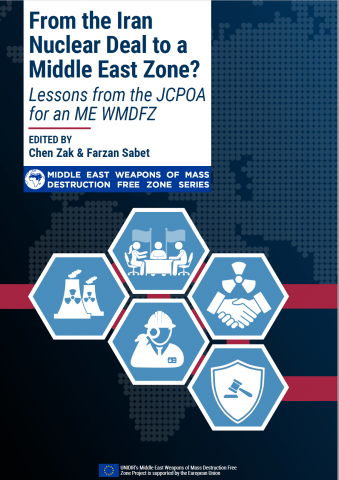
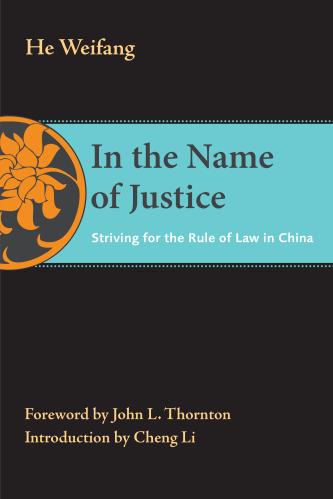
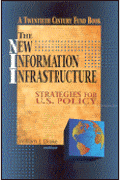
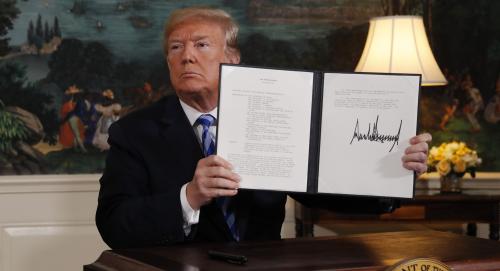
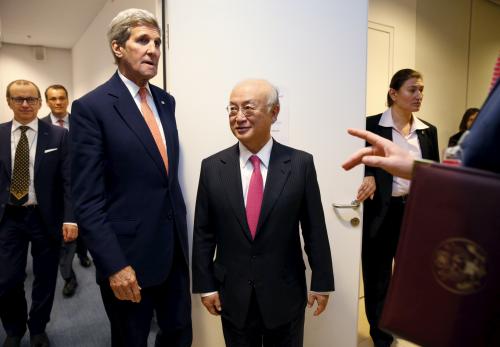
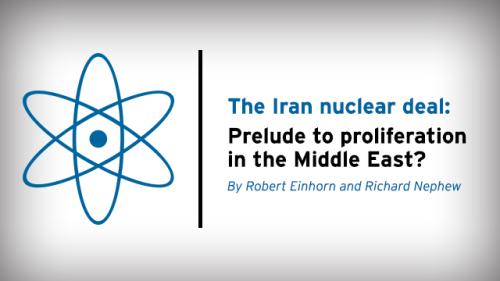










Commentary
The Iran deal, one year out: What Brookings experts are saying
July 14, 2016